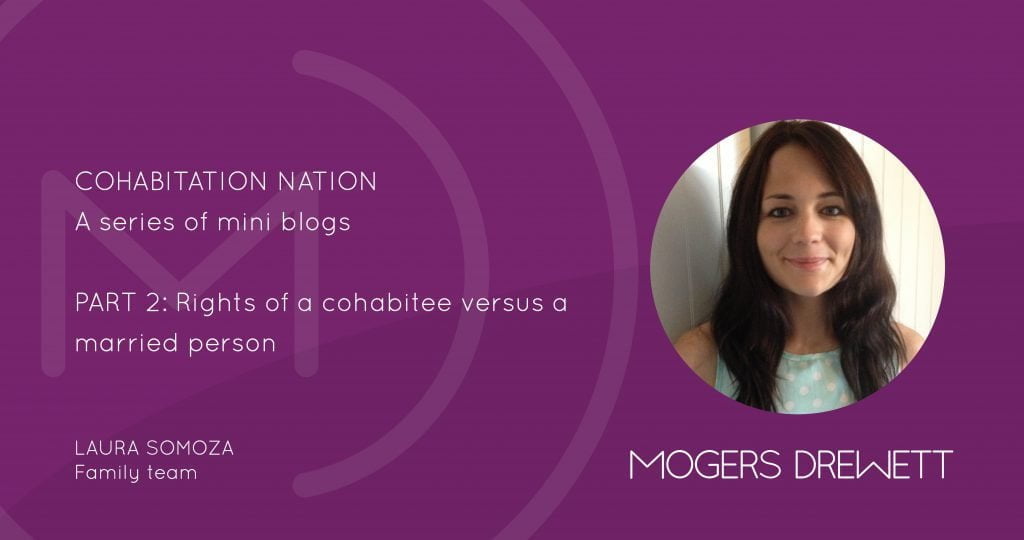Cohabitation Nation – Rights of a cohabitee versus a married person

The concept of a ‘common law spouse’ is not recognised under English Law. This means that often people mistakenly believe that the law offers cohabitating couples protection, especially when they have been in a relationship for a number of years. This week we will be exploring topics relating to cohabitation and dispelling a few myths In today’s article by Laura Somoza, we look at the rights of those living together compared to married couples.
As the number of people living together increases, some cohabitees are left unaware of the stark financial implications if the relationship then breaks down. This leaves people not only having to deal with the emotional effects of relationship breakdown, but also having to deal with stress of financial uncertainty.
Marriage is certainly not ‘just a piece of paper’. Marriage brings with it a bundle of rights which are not available to cohabitees. These rights are wide ranging and do not only extend to financial implications. For example in certain criminal proceedings, a spouse does not have to give evidence against their spouse but cohabitees would be required to. In addition marriage entails one spouse having a reasonable right to the other spouse’s company, and also brings an obligation of confidence meaning one spouse cannot misuse private information to the other’s detriment. These same obligations are not recognised for cohabitees.
It is the financial consequences of relationship breakdown that can leave cohabitees in a vulnerable position, therefore it is essential to understand the differences between cohabitation and marriage:
Financial support upon breakdown
Upon separation, there is no legal obligation for maintenance or financial support for cohabitees. This can be a hard hitting realisation for cohabitees, especially if they have lived together for a long period of time and one party has perhaps reduced their income potential to support the other. For those who are married there is a legal obligation regarding maintenance.
Occupation of the family home
When it comes to occupation of the family home, a spouse receives automatic rights of occupation upon relationship breakdown. The same rights of occupation do not exist for cohabitees where a property is held in the other’s sole name. If one party believes that they have contributed to the property in some way, for example by financial contributions, the issue of ownership can only be decided by reference to property or trust law. To pursue an application can be a costly process and the bar to proving contribution to a property in another’s sole name can be set high.
Pension
Upon relationship breakdown, spouses will have a right to the other spouse’s pension, often providing an essential stream of income especially where there has been a disparity in earning potential in the relationship. For cohabitees there is no right to share pensions which can leave one party vulnerable upon retirement.
Death
Upon death a cohabitee will have no automatic entitlement to their partner’s assets in the absence of a Will, and the deceased’s assets will be decided by way of the law of intestacy. Spouses however have an automatic right of inheritance of the other in the absence of a Will. Recording each person’s intention upon death in a signed Will can help to alleviate any stress or disputes that may arise, especially when dealing with grief.
Children of the family
When it comes to children of the family, a father does not have automatic parental responsibility for the child unless he is married to the mother at the time of the birth or is named as father on the birth certificate. Cohabitees should ensure that they have parental responsibility for the child, either by way of being named on the birth certificate as father or by entering into a parental responsibility agreement.
Whatever arrangements you decide for your family living, whether as cohabitees or as spouses, it is imperative to be aware of what your status means from a legal perspective. This assists to make a fully informed decision and to put the necessary measures in place to protect for the future. There are various ways that cohabitees can attempt to bridge this gap in rights. For example a cohabitation agreement sets out intended arrangements between cohabitees, such has how the bills and mortgage or rent will be paid on the property, any arrangements for children of the family, and what would happen to shared money and assets if the relationship broke down.
These agreements remain persuasive with the court as to the parties’ intentions, especially if they are entered into freely and with consent and both parties have received independent advice as to the fairness of the agreement.
Please contact any one of our family team on 0800 533 5349 and they will happily advise you more of the legal differences between cohabitation and marriage and in turn offer advice so as to best protect your interests and assets however you choose to live.
